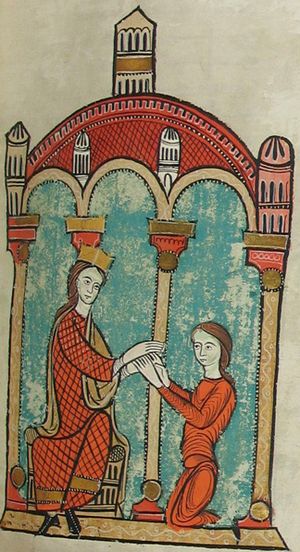Ramon Berenguer IV, Count of Barcelona facts for kids
Quick facts for kids Ramon Berenguer IV |
|
|---|---|
| Count of Barcelona | |
 |
|
| Ramon Berenguer IV in the 12th-century Liber feudorum maior | |
|
|
|
| Reign | 19 August 1131 – 6 August 1162 |
| Predecessor | Ramon Berenguer III |
| Successor | Alfonso I |
| Spouse(s) | Petronilla of Aragon |
| Issue | |
| Infante Peter Alfonso II of Aragon Ramon Berenguer III, Count of Provence Dulce, Queen of Portugal Sancho, Count of Provence Ramon, Archbishop of Narbonne (illegitimate) |
|
| Noble family | Barcelona |
| Father | Ramon Berenguer III, Count of Barcelona |
| Mother | Douce I, Countess of Provence |
| Born | c. 1114 Rodez |
| Died | 6 August 1162 (aged 48–49) Borgo San Dalmazzo, Piedmont, Italy |
| Burial | Santa Maria de Ripoll |
Ramon Berenguer IV (born around 1114 – died August 6, 1162) was an important count of Barcelona. He is famous for bringing together the County of Barcelona and the Kingdom of Aragon. This union created a powerful new realm called the Crown of Aragon. Sometimes, people called him the Saint.
Contents
Becoming a Ruler
Ramon Berenguer was born in 1114. His father was Ramon Berenguer III, Count of Barcelona, and his mother was Douce I, Countess of Provence. Ramon became the Count of Barcelona on August 19, 1131, after his father.
In 1137, when Ramon was about 24, he got engaged to Petronilla of Aragon. She was only one year old at the time! Petronilla's father, King Ramiro II of Aragon, needed help from Barcelona. He wanted to protect his kingdom from King Alfonso VII of León and Castile.
After the engagement, King Ramiro II decided to step back from ruling. He left his kingdom to his daughter Petronilla and Ramon Berenguer. This meant Ramon became the ruler of Aragon. Even though he was in charge, he was never called "King" of Aragon. Instead, he used titles like "Count of the Barcelonans and Prince of the Aragonians." He also became "Marquis of Lleida and Tortosa" after he conquered those cities.
A Smart Agreement
Ramon Berenguer and King Ramiro II made a special agreement. It said that their children would rule both Barcelona and Aragon together. Even if Petronilla died before they officially married, Ramon's children would still inherit Aragon.
This agreement was very clever. Both Barcelona and Aragon kept their own laws and traditions. They stayed separate but were joined under one ruling family. This made both regions stronger and safer. Aragon, which was inland, also gained access to the sea through Barcelona. This new powerful state in the northeast helped balance the other Christian kingdoms in Spain. Ramon also managed to free Aragon from being under the control of Castile. His sister, Berengaria of Barcelona, who was married to Alfonso VII, likely helped with this.
Fighting and Crusades
Later in his rule, Ramon Berenguer focused on fighting against the Moors. The Moors were Muslim rulers in parts of Spain.
In October 1147, Ramon helped Castile capture the city of Almería. This was part of a bigger religious war called the Second Crusade. After that, he attacked the lands of the Almoravid kingdoms, which included Valencia and Murcia.
In December 1148, Ramon captured the city of Tortosa. This happened after a six-month siege. He had help from crusaders from Southern France, England, and Genoa. Later, when the Moors tried to take Tortosa back, the women of the city fought so bravely that Ramon created a special award for them called the Order of the Hatchet. The next year, his army took control of Fraga, Lleida, and Mequinenza. These cities were important because they were near the Segre and Ebro rivers.
Ramon Berenguer also helped his family in Provence. He supported his brother Berenguer Ramon I, Count of Provence and his young nephew Ramon Berenguer II, Count of Provence against their enemies. For a time, Ramon Berenguer IV also acted as a regent (a temporary ruler) for Provence between 1144 and 1157.
In 1151, Ramon signed the Treaty of Tudilén with Alfonso VII of León and Castile. This treaty helped them decide which areas each ruler could conquer in the south of Spain. This prevented them from fighting each other. Also in 1151, Ramon Berenguer started a royal monastery called Poblet. In 1154, he became the regent for Gaston V of Béarn, which added that small area to the growing Aragonese state.
Family Life
Ramon and Petronilla had several children:
- Alfonso II of Aragon
- Ramon Berenguer III, Count of Provence
- Dulce, Queen of Portugal
- Sancho, Count of Provence
His Death
Ramon Berenguer IV passed away on August 6, 1162, in Borgo San Dalmazzo, Italy. His oldest son, Ramon Berenguer, took over as Count. When his mother Petronilla gave up her title in 1164, he also became King of Aragon. To honor his Aragonese family, he changed his name to Alfonso, becoming Alfonso II of Aragon. Ramon Berenguer IV's younger son, Pere (Peter), inherited lands north of the Pyrenees mountains and changed his name to Ramon Berenguer.
What He Was Like
The Chronicle of San Juan de la Peña, an old historical book, described Ramon Berenguer IV as a very noble, wise, and honest man. It said he was lively, had good ideas, was very brave, and always thought clearly. He was also described as handsome, with a strong body and well-proportioned limbs.
See also
 In Spanish: Ramón Berenguer IV de Barcelona para niños
In Spanish: Ramón Berenguer IV de Barcelona para niños

